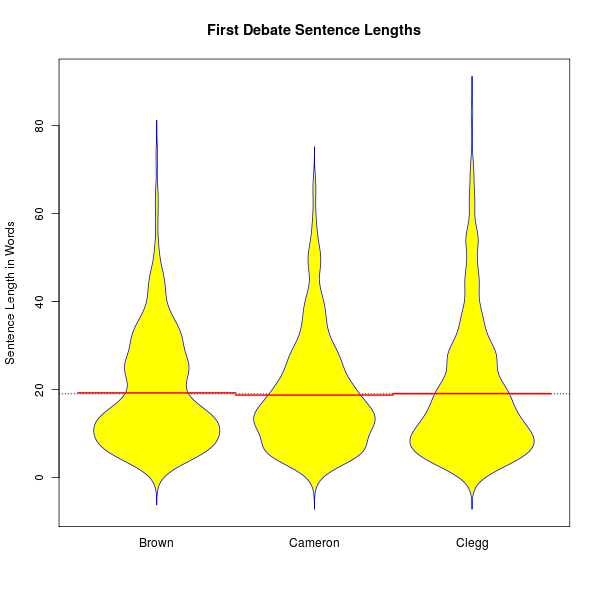Lounging in the luxury of super-size sentences?
« previous post | next post »
For some reason, the current British election campaign has been mercifully free of empty pontificating about first-person pronouns. But Tom Clark, "Barack Obama's travel rhetoric rubs off on Nick Clegg's general election talk", The Guardian, 5/6/2010, did take a shot at reading aspects of political character from candidates' distributions of sentence lengths:
Like the Conservatives, the Lib Dems are laying emphasis on cutting waste. [The speech-writing consultancy] Bespoke reveals both parties demonstrate a striking economy with words when compared with Labour. The average sentence in a Liberal or Tory speech is just 14 words, which is five shorter than Labour. Among the leaders the gap is even bigger, with Gordon Brown's tally of 22 in the average sentence being positively verbose when compared with David Cameron's 13, never mind Clegg's even pithier 12. [Simon] Lancaster [director of the speech-writing consultancy Bespoke] believes the trappings of office can encourage a taste for "lounging in the luxury of super-size statements" when compared with the breathless demands for change that typically characterise opposition.
Since Bespoke's analysis was attributed to James Pennebaker, who is a serious and careful observer of textual statistics, I'm sure that there's a suitable collection of speeches for which the cited values are valid. But in the interests of replication and further analysis, I thought I'd take a look at this metric as applied to the candidates' performances in one of their debates.
The first debate took place on April 15, 2010, in Manchester. A textual form of the transcript is here, and I've broken out the contributions of Brown, Cameron, and Clegg individually, divided (automatically, and therefore perhaps sometimes wrongly) into sentences, if you want to follow along at home or try your own analysis.
A quick numerical survey finds little support for the hypothesis of incumbent sentential sprawl. The median sentence lengths were 15 for (the Labour incumbent) Gordon Brown, 16 for (the Tory challenger) David Cameron, and 15 for (the Liberal Democrat upstart) Nick Clegg. The means were 19.26 for Brown, 18.77 for Cameron, and 19.09 for Clegg.
Displaying the full distribution of lengths as a "beanplot" produces little more in the way of metaphorical meat:
The lengths of political sentences certainly do vary in systematic ways, most obviously as a function of broader stylistic changes over the past couple of hundred years. But if "the trappings of office" have given Gordon Brown "a taste for 'lounging in the luxury of super-size statements'", at least as measured in words per sentence in comparison with the contributions of his competitors, he didn't show it in the first of their debates.

Amerloc said,
May 6, 2010 @ 8:55 pm
50 years ago, as I was learning to read and to spell, I'd have never guessed those would lead to finding this funny. But they did.
Thank you for the chuckle.
Beyond that, thank you for the scholarship that made the post possible, and for the happenstance that made "incumbent sentential sprawl" an appropriate phrase. I may not sleep tonight, just rolling it around in my mouth.
Peter said,
May 6, 2010 @ 9:04 pm
It looks like Clegg used the most long sentences. In fact, looking at sentences longer than about 50 words, Brown was the least verbose.
Simon Cauchi said,
May 6, 2010 @ 9:21 pm
Incumbent sentential sprawl is presumably the result of unchecked verbal ribbon development.
Rubrick said,
May 6, 2010 @ 9:42 pm
It's futile to try to get meat from a beanplot.
[(myl) I was tempted to mix the metaphor further by noting that the blobs could be seen as collections of tea leaves (especially if I modified the color scheme appropriately). On the other hand, you could also see them as especially incompetent sausages, which traditionally do have a certain amount of meat-like content.]
Mel Nicholson said,
May 6, 2010 @ 9:54 pm
Tom Clark should be forced to count the words per sentence in a Palin speech as punishment. Don't tell him in advance that there aren't any sentences.
Henning Makholm said,
May 6, 2010 @ 10:38 pm
Is it just me, or is Brown using slightly fewer negative-length sentences than his challengers? If so, he gets my vote. Never could stand those.
[(myl) It's that illusory micro-time-travel caused by treating quantized time with continuous mathematics (such as the smoothing kernel used in the beanplot code). As Agatha Heterodyne showed in her famous paper on the topic, no actual information can appear in the words with apparently negative indices, and therefore the purely negative-length sentences are also guaranteed to be content free. So you're safe, though it's normal to find the phenomenon disconcerting at first.]
Ran Ari-Gur said,
May 7, 2010 @ 6:21 pm
According to the paper you link to, a "beanplot" shows not only the density trace, but also a one-dimensional scatterplot of individual results. Has the terminology evolved a bit since that paper was published, or are you using the term a bit loosely, or am I misunderstanding something?